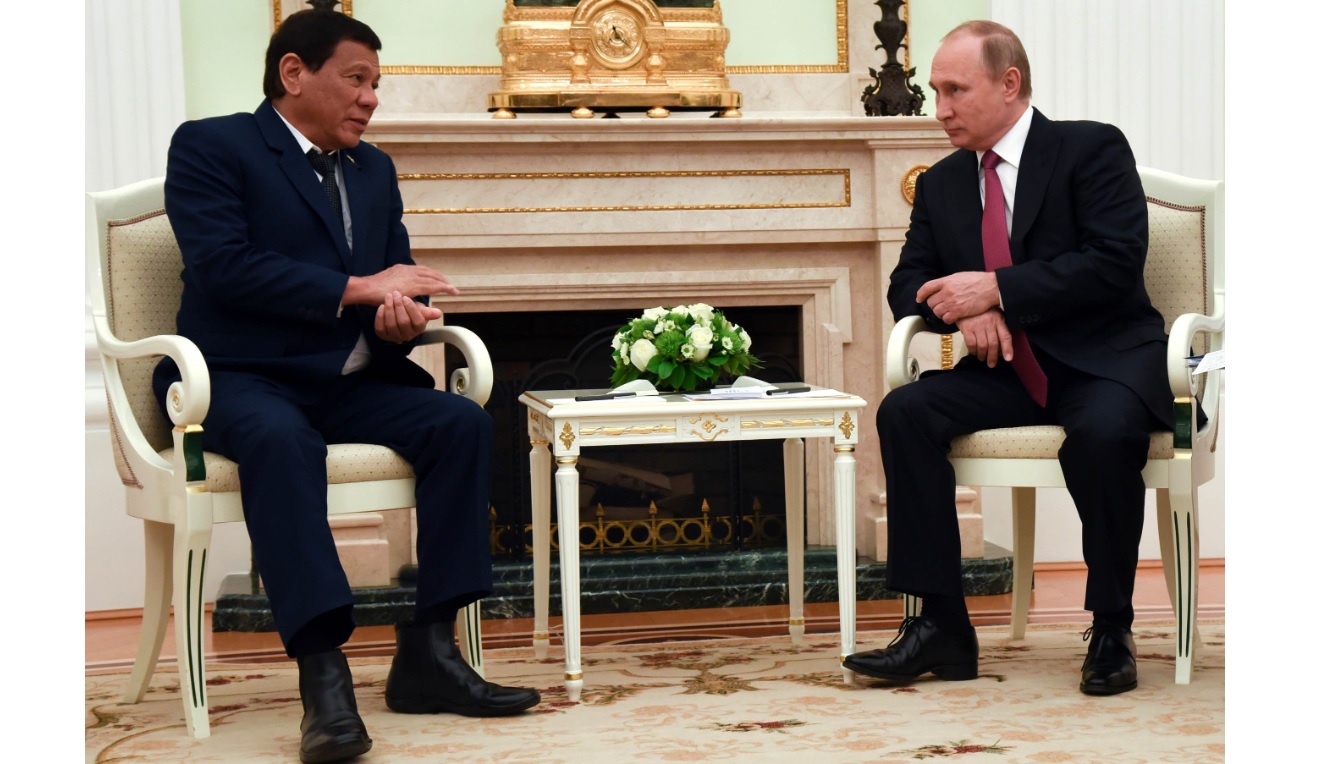

President Rodrigo Duterte meets with Russian President Vladimir Putin at the Kremlin in Moscow in May 2017. PRESIDENTIAL PHOTO
Rodrigo Duterte’s second trip to Russia in the first week of October will give him a chance to demonstrate the wisdom of his effort to lessen the Philippines’ dependence on its long-time ally and security partner, the United States, meant to diversify the country’s economic and military relations.
It is also very timely given the pressure on world crude prices as well as the reliability of supply of the world’s most important commodity, following the recent drone attack on Saudi Arabia’s oil facilities and as the Philippines’s reliance on fossil fuels to run its power plants grew to almost 50 percent in recent years.
Oil is a very strategic commodity as what the world had learned during the 1970 crisis, which crippled economies and fueled serious security concerns, including in the Philippines. Thus, it will be a golden opportunity for the Philippines to escape another oil shock if the situation in the Middle East deteriorates. Duterte may negotiate an oil deal with Vladimir Putin to ensure a more stable, reliable and alternative supply, reducing the country’s dependence on Saudi Arabia and Arabian Gulf States.
More than 90 percent of Philippine oil imports are from the Middle East – Saudi Arabia, Kuwait, Qatar, Oman and United Arab Emirates. Only 6.9 percent of oil imports in 2017 came from Russia although last year, Manila sourced about 240 million liters of diesel, equivalent to three days of the country’s requirements, as part of its strategic reserve.
The drone attack in Saudi Arabia and uncertainty in the Middle East has made it important and urgent for Duterte to discuss a strategic oil supply deal with Russia, and find more reliable source away from the volatile Middle East region as tension rises with Iran, the United States and Saudi Arabia’s archrival. The US is also trying to stop Iran from developing nuclear weapons, which could further jeopardize regional security and make Israel, which is already dealing with Iran-backed militants in the Middle East, nervous.
Apart from oil supply, Duterte’s visit to Moscow and Sochi, a summer beach resort city on the Black Sea where the 2014 Winter Olympics took place, will demonstrate the country’ s foreign policy shift, moving away from the influence of, and cozy relations with, the West.
This will be the second time Duterte will be in Moscow since 2017 when his first official visit was cut short by pro-Islamist militants’ attack and five-month occupation of Marawi City.
Russia has become important for the Philippines since 2016 after Duterte was elected into office, not only because the president is a huge fan of the Russian leader but probably due to his dislike of the very liberal US President Barack Obama, whose administration was a staunch critic of his policies and human rights record.
For most Filipinos, who are obviously pro-American, Duterte’s dramatic foreign policy shift to Russia and China was a mistake. But it may actually benefit the country as both the United States and Western countries on one side, and Russia and China, on the other side, will now compete for attention to win close friendship with the Philippines.
Military cooperation with Washington even expanded despite Duterte’s warming relations with China and Russia, with about 300 bilateral training activities set next year from 281 activities this year, as well as increasing ship and aircraft visits to several military bases allowed under the 2014 Enhanced Defense Cooperation Agreement (EDCA).
In the past, the United States transferred obsolete and second-hand military equipment, like ships, helicopters and rifles. Since 2017 when China and Russia donated token small arms and other equipment, Washington started giving out maritime surveillance gadgets as well as drones for free just to keep Manila on its side.
The United States will probably make available its top-of-line military platform for friendly prices after the Philippines started bargain shopping for weapons from other cheaper and affordable sources like Russia, which has been offering submarines, helicopters and armored vehicles. Manila has initially agreed to acquire hundreds of rocket propelled grenades (RPGs) despite sanctions imposed by the United States on Russia for its role in Syria and the invasion of Crimea.
Russia’s military equipment is not necessarily inferior and may be among the topics for discussion when Duterte meets Putin in October. In the past, Moscow was willing to trade a squadron of MiG fighters for Manila’s banana, pineapple or tuna exports. Russian aircraft are better suited to Philippine rough airfields rather than American fighters, which need smoother and better runways.
Manila has listed at least one electric-diesel submarine under its second horizon, the 2017-2022 modernization program; the Kilo-class Russian submarine, which other Southeast Asian countries, like Vietnam has been operating, fits the the requirement. It will take at least a decade to train crew and maintenance personnel as well as prepare for a submarine base before the Philippine Navy can become proficient in sub-surface naval warfare capability. So, the Philippine Navy should start with a cheaper second-hand submarine from Russia.
Apart from oil supply and military hardware, the two leaders may have other agenda to strengthen and deepen bilateral economic, political, military cooperation and people-to-people ties. Their offices have to issue yet an official statement on the topics to be discussed in the summit.
Duterte may have been to Beijing many times than Moscow but his five trips to the Chinese capital had resulted in very little tangible benefits and mere investment pledges. The China trips did not resolve the territorial dispute in South China Sea and Philippine civilian vessels, and fishermen continue to be harassed by Chinese coast guard and maritime patrol ships.
For Duterte’s visit to be worth the long trip, there must be tangible results from the one-on-one meetings. Let’s hope that the pro-Islamist militant groups do not spoil the trip with another attack as huge as in Marawi in May 2017.